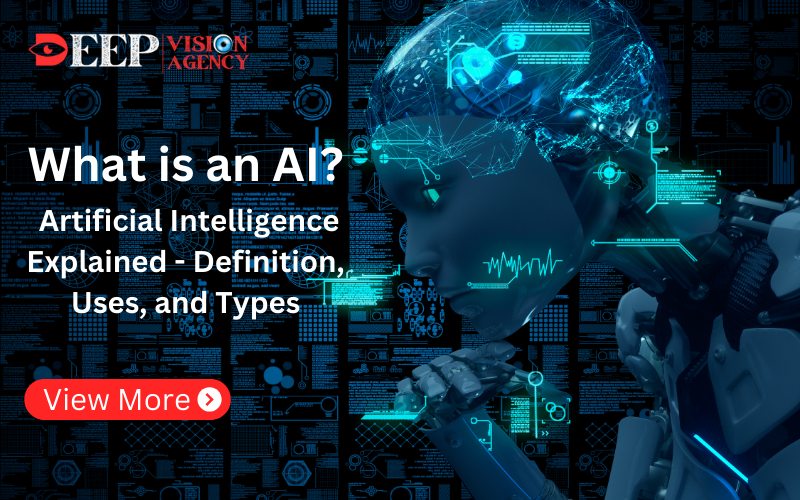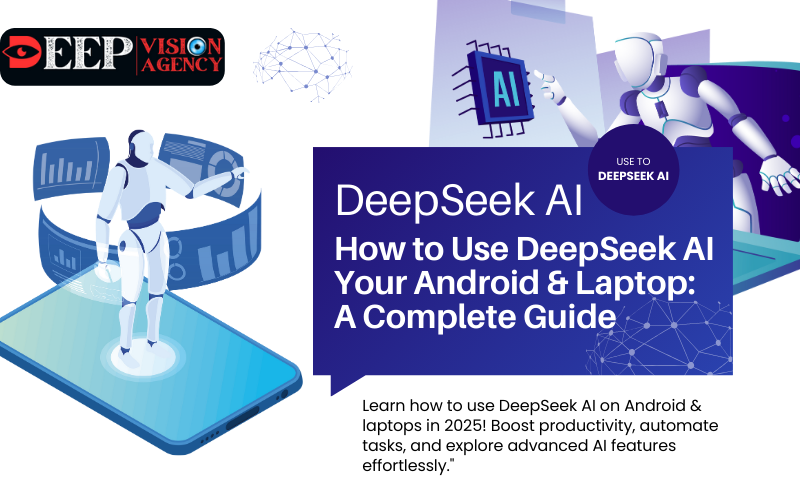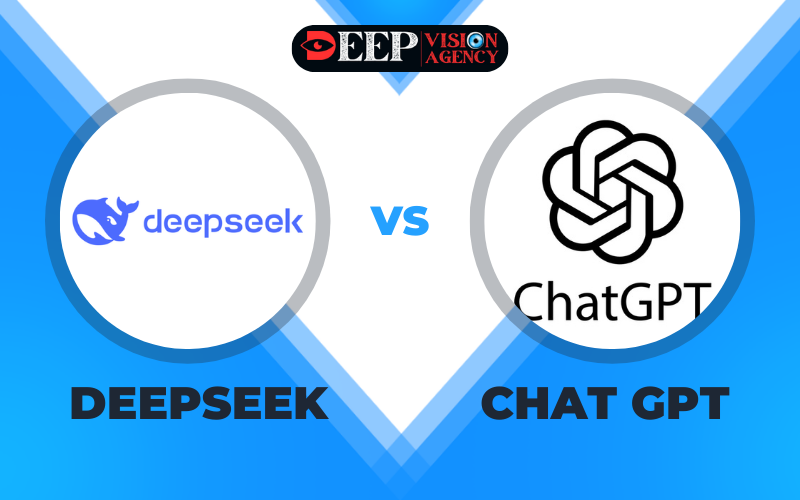What is an AI? Artificial Intelligence Explained – Definition, Uses, and Types
Introduction to Artificial Intelligence
If you’ve ever asked Siri for the weather or used Google Assistant to send a text, you’ve interacted with artificial intelligence. But what exactly is artificial intelligence? Let’s break it down.
What is AI?
Artificial Intelligence refers to machines or software designed to perform tasks that usually require human intelligence. These tasks can include reasoning, learning, problem-solving, and decision-making. Think of it as giving machines the ability to think, learn, and act without human help.
The Journey of AI
AI isn’t a new idea. The concept of artificial intelligence dates back to the 1950s, with pioneers like Alan Turing. Over the years, it has evolved with advancements in computing power and smarter algorithms. Today, artificial intelligence is helping solve some of the world’s biggest challenges.
How Does AI Work?
What Does AI Mean for Machines?
AI allows machines to “learn” from data and perform tasks by mimicking human intelligence. But artificial intelligence isn’t human—it doesn’t think or feel like we do. It simply analyzes data and improves its actions over time.
How AI Works: A Simple Explanation
Here’s the simple version: AI learns by processing lots of data and using algorithms (basically, rules or instructions). The more data it processes, the smarter it gets at performing tasks.
Types of AI
AI is not just one thing. There are different types of artificial intelligence based on its capabilities:
Narrow AI (Weak AI)
This is the kind of AI we use every day. Narrow artificial intelligence is designed to do a specific task, like recommending a movie on Netflix or helping you with voice commands. It’s smart but only in one area.
General AI (Strong AI)
General AI is the ultimate goal of artificial intelligence researchers—machines that can perform any intellectual task that a human can do. We haven’t reached this level yet, but we’re working on it.
Superintelligent AI
Imagine a machine that’s smarter than humans in every way. Superintelligent artificial intelligence would be able to solve problems faster and more efficiently than any human. While this idea is fascinating, it also raises concerns about safety and control.
artificial intelligence vs. Human Intelligence: Key Differences
Speed and Memory
AI is incredibly fast at processing information. It can analyze large amounts of data in a split second, while humans may take a lot longer.
Creativity and Emotions
AI doesn’t have emotions or creativity like humans. It can generate art, music, or even write stories, but it doesn’t “feel” the way humans do. It follows patterns and logic, but it lacks the human touch of true creativity.
Key Components That Make AI Work
artificial intelligence isn’t just one thing; it’s built on a few important technologies:
Machine Learning
Machine learning is a type of artificial intelligence that enables machines to learn from data. The more data they get, the better they get at recognizing patterns and making predictions.
Neural Networks
Neural networks are inspired by the human brain and help artificial intelligence understand complex patterns. They’re used in deep learning, which powers things like speech recognition and image classification.
Natural Language Processing (NLP)
NLP allows machines to understand and interpret human language. It’s the technology behind voice assistants like Siri, Alexa, and Google Assistant, enabling them to understand and respond to your questions.
Computer Vision
Computer vision enables artificial intelligence to see and interpret the world through images and videos. It’s used in facial recognition, self-driving cars, and even in medical imaging to detect diseases.
How AI is Used in Everyday Life
AI is already a part of your life, often in ways you might not even realize. Here are a few examples:
artificial intelligence in Healthcare
AI is helping doctors diagnose diseases, analyze medical images, and even predict patient outcomes. It’s making healthcare more efficient and accessible.
artificial intelligencein Banking and Finance
From detecting fraud to managing investments, artificial intelligence is making the banking system safer and more efficient. It’s also used in customer service to quickly respond to inquiries.
artificial intelligence in Transportation
AI is transforming transportation with self-driving cars, drones, and smarter traffic systems. It’s making travel safer and more efficient.
artificial intelligence in Entertainment
AI is used by streaming platforms like Netflix to recommend movies based on what you’ve watched before. It’s also used in video games and music to create personalized experiences.
artificial intelligence in Education
AI is helping personalize learning in schools. It can adapt to each student’s needs and provide customized lessons, while also grading assignments automatically.
The Future of Artificial Intelligence
artificial intelligence and Automation
One of the most exciting aspects of artificial intelligence is automation. Artificial intelligence can handle repetitive tasks, freeing up humans for more creative and strategic work. This is already happening in manufacturing, customer service, and more.
artificial intelligence Solving Global Problems
AI holds the potential to solve some of the world’s biggest challenges, such as climate change, disease prevention, and poverty. By analyzing massive amounts of data, artificial intelligence can help find solutions we might never have imagined.
Ethical Issues with artificial intelligence
While artificial intelligence has incredible potential, it also raises important ethical questions:
Privacy Concerns
artificial intelligence relies on data, which can sometimes include sensitive personal information. It’s crucial to protect privacy and ensure data isn’t misused.
Job Loss and Automation
AI can replace jobs that involve routine tasks, which may cause some people to lose their jobs. However, it also creates new job opportunities, especially in technology and artificial intelligence development.
artificial intelligence Bias
AI can inherit biases from the data it’s trained on. If the data is biased, the artificial intelligence may make unfair decisions. This is why it’s important to ensure artificial intelligence systems are fair and unbiased.
Conclusion: The Role of artificial intelligence in Our Future
artificial intelligence is already reshaping our world in many ways, from improving healthcare to transforming industries. As artificial intelligence continues to advance, it has the potential to change even more aspects of our lives. But it’s crucial that we use artificial intelligence responsibly to ensure it benefits society as a whole.
FAQs
How will AI impact jobs in the future? AI will automate many jobs, especially those that involve repetitive tasks. However, it will also create new jobs in technology and artificial intelligence-related fields.
What’s the difference between artificial intelligence and Machine Learning? AI is the broad concept of machines performing tasks that require human-like intelligence. Machine learning is a type of artificial intelligence where machines learn from data and improve over time.
Is artificial intelligence safe for humans? If developed responsibly, artificial intelligence can be safe. However, privacy concerns, job displacement, and biases in artificial intelligence systems need to be addressed.
What is General AI? General artificial intelligence refers to machines that can perform any intellectual task a human can do. This level of artificial intelligence doesn’t exist yet, but it’s the long-term goal.
Can artificial intelligence think like humans? AI can simulate some aspects of human thinking, but it doesn’t have emotions or true understanding. It processes data and follows patterns rather than “thinking” like humans.
You may also like: Digital Marketing, Best Digital Marketing Services, SEO Services, Website Design and Development, Pay-Per-Click (PPC) Advertising, Social Media Marketing (SMM), E-Commerce Services
Follow Us: Quora, Facebook, Instagram, Twitter





